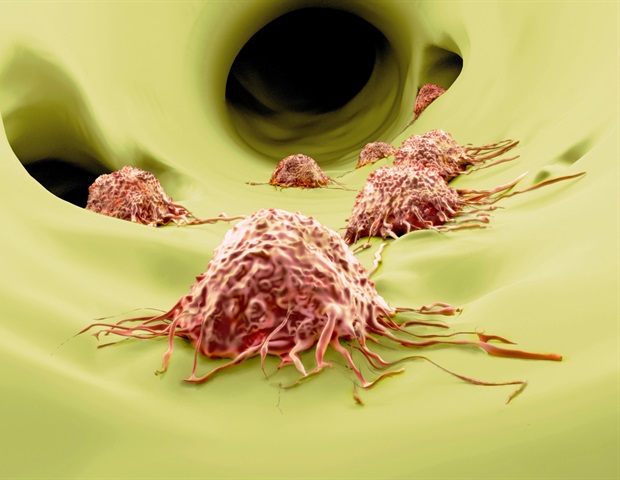
A transcription factor normally associated with androgen receptor activity in prostate cancer has a newly discovered role in controlling lipid biosynthesis, according to a Northwestern Medicine study published in Nature Genetics.
The transcription factor, called HOXB13, is downregulated in late-stage prostate cancer, unleashing lipid biosynthesis and fueling cancer metastasis, according to Jindan Yu, MD, PhD, professor of Medicine in the Division of Hematology and Oncology and senior author of the study.
"HOXB13 has mostly been studied as a gene activator, but our study shows its main function in transcriptional repression of lipid biosynthesis," said Yu, who is also a professor of Biochemistry and Molecular Genetics and a member of the Robert H. Lurie Comprehensive Cancer Center of Northwestern University.
HOXB13 is a prostate-specific protein that is highly expressed in the prostate during development. It boosts androgen receptor (AR) function, which in turn helps prostate cells grow.
In prostate cancer, androgen hormones fuel uncontrolled cell growth and AR inhibitor therapies are the mainstay of care. However, most metastatic prostate cancers will eventually develop resistance to AR therapy, with the tumors eventually reducing their dependency on androgen by becoming more like stem cells. Previous studies have shown that while HOXB13 has significant interaction with AR, their expression patterns do not match, with HOXB13 downregulating while AR upregulating as the cancer progresses.
We thought something was missing about HOXB13, because HOXB13 and AR expression diverged."
Jindan Yu, MD, PhD, Study's Senior Author
In the current study, scientists investigated the non-AR functions of HOXB13, finding that the transcription factor has an entirely separate function in suppressing lipid biosynthesis, as part of the body's normal defense against cancer. However, as prostate cancer cells lose their lineage and become treatment-resistant, they also lose expression of the prostate-specific HOXB13, resulting in a marked increase in lipid biosynthesis that can fuel cancer metastases.
"These cells forget who they are, which makes them AR-inhibitor resistant and can help the cancer spread," Yu said.
More than 30 percent of treatment-resistant prostate cancer patients are HOXB13-negative and thus have elevated lipid biosynthesis in their cancers, so targeting this pathway could prove useful in prolonging survival for late-stage prostate cancer patients.
A drug called TVB-2640 that's already in clinical trials for breast and small-cell lung cancer may help: The drug inhibits an enzyme that's critical for the lipid biosynthesis pathway, restoring some of that normal inhibition that acts as a natural defense against cell proliferation and cancer.
"Now, we just need to identify the optimal population in which to use this drug," Yu said.
The study also helped explain the curious case of G84E, a familial mutation in HOXB13 that increases risk for early-onset prostate cancer, but cancer severity was no different between patients with the G84E mutation and those without. The pathogenesis of the disease had previously been unknown, but the current study found the mutation disrupts lipid biosynthesis inhibition, increasing levels of prostate-specific antigen (PSA), a biomarker sometimes used to screen for prostate cancer.
These findings raise the possibility that the observed increased risk of early-onset prostate cancer associated with G84E may be an epidemiological trick rather than a true pathogenic mutation at the time of diagnosis, according to Yu and co-author William Catalona, MD, professor of Urology and a pioneer in using PSA as a screening tool for prostate cancer.
"These patients have a family history, so they get screened for prostate cancer frequently and at a younger age," Yu said. "This earlier diagnosis of G84E patients assures disease management at an earlier stage, which might have offered protection as it cures the disease before it reaches a treatment-resistant stage when G84E becomes pathogenic and promotes tumor metastasis."
This work was supported by National Institutes of Health grants R01CA257446 and R01CA227918, Prostate Cancer SPORE P50CA180995, Prostate Cancer Foundation grant no. 2017CHAL2008 and Department of Defense grant W81XWH-17-1-0578.
Northwestern University
Lu, X., et al. (2022) HOXB13 suppresses de novo lipogenesis through HDAC3-mediated epigenetic reprogramming in prostate cancer. Nature Genetics. doi.org/10.1038/s41588-022-01045-8.
Posted in: Men's Health News | Medical Science News | Medical Research News
Tags: Androgen, Antigen, Biochemistry, Biomarker, Cancer, Cell, Cell Proliferation, Enzyme, Gene, Genetics, Hematology, Lung Cancer, Medicine, Metastasis, Mutation, Oncology, Proliferation, Prostate, Prostate Cancer, Prostate-Specific Antigen, Protein, Receptor, Stem Cells, Transcription, Tumor, Urology
Source: Read Full Article